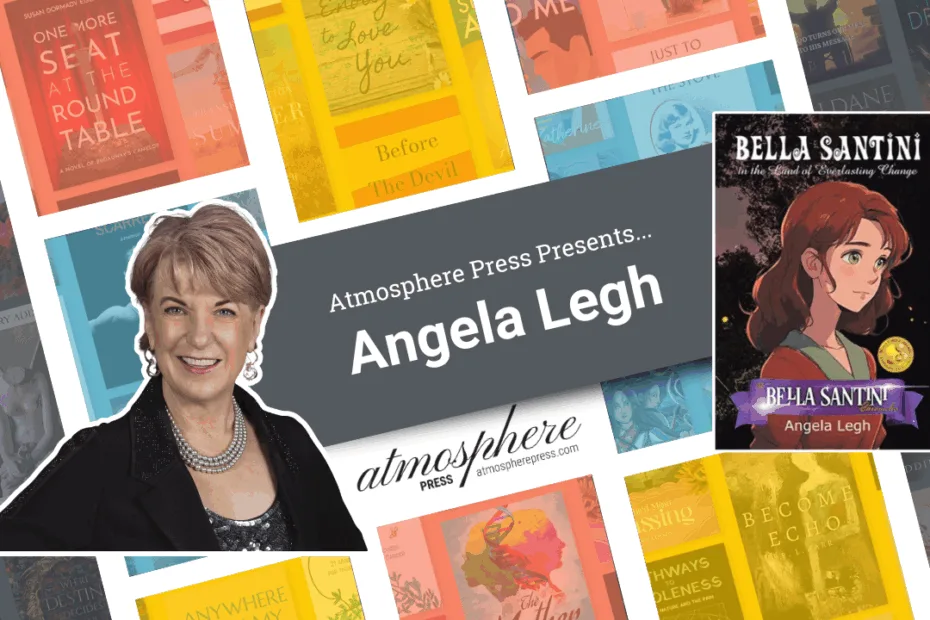An Interview with Angela Legh

Angela Legh is best known for her award-winning middle-grade fantasy series, The Bella Santini Chronicles. More than magical adventures, her books are crafted to help children understand their emotions, build resilience, and discover that love is the greatest power of all. In addition to writing, Angela is a journalist and television producer, dedicated to raising humanity’s emotional literacy through stories, resources, and heartfelt conversations.
Who/what made you want to write? Was there a particular person, or particular writers/works/art forms that influenced you?
When I was in second grade, my teacher read The Hobbit to us, one chapter at a time. I can still remember the feeling of being transported into a magical world just by the sound of her voice. It lit a spark in me. I realized stories could carry us to places we had never imagined, and they could also teach us truths about courage, friendship, and heart. That sense of magic stayed with me, and it shaped both my love for fantasy and my desire to write stories that do more than entertain. I wanted to create worlds where children could be swept up in adventure while quietly learning how to trust themselves, navigate their feelings, and know that love is the greatest power of all.
What inspired you to start writing this book?
I first began writing as a gift for a friend’s daughter, Isabella, who was nine years old at the time. I wanted to give her a story filled with magic and wonder, something that would delight her imagination. What started as a simple short story quickly grew bigger than I expected. The characters came alive, the world unfolded, and before I knew it I had stepped into an entire series. I wrote to entertain Isabella, but I discovered along the way that these stories had deeper messages for children everywhere. And once I started writing, I simply could not stop.
Tell us the story of your book’s title. Was it easy to find, or did it take forever?
The title began with the character herself. Bella Santini came to me first, and I knew her name would be at the heart of the book. As I wrote, the story kept growing until I realized it was far too big for one volume. Sixty thousand words is simply too much for a child to take in, so I divided it into two books. The story had found its shape, but the title was still escaping me. Then one evening, I heard someone refer to the Fae Realm as the Land of Everlasting Change. The moment I heard those words, I knew I had my title. It fit the story perfectly, because change is the essence of both Bella’s journey and the world she discovers.
If your book had a soundtrack, what are some songs that would be on it?
Imagine by John Lennon—for the underlying message of unity, compassion, and a world guided by love. Though other songs could apply, this song is the essence of what my work is about.
What other professions have you worked in? What’s something about you that your readers wouldn’t know?
I’ve had quite a mix of professions. I even started out loading dishes into a commercial dishwasher in a restaurant, which gave me plenty of time to daydream while the machine did its work. Later, I became a mortgage lender, then a middle manager in government. These days, my life looks very different. I am an author, a journalist, and a television producer. What surprises people is that each of these roles taught me something I carry into my stories. From persistence to people skills, all of it now shows up in the magical adventures of Bella Santini.
What books did you read (for research or comfort) throughout your writing process?
I immersed myself in books that explore magic in its many forms. A Discovery of Witches drew me in with its blend of history and enchantment. Neil Gaiman’s The Ocean at the End of the Lane captured the wonder and mystery I love to bring into my own stories. Even Stephen King’s Fairy Tale was part of my journey, reminding me how darkness and light are always intertwined in fantasy. I read widely because every magical tale, no matter how different in style, holds something that deepens my own storytelling.
What’s one thing you hope sticks with readers after they finish your book?
What I most hope is that readers come away with a deeper understanding of their own emotional landscape, and a sense that their feelings are not flaws but important guides. Alongside that, I hope they rediscover the power of play. Play is not just for children; it is a doorway to creativity, resilience, and joy. If my stories can remind readers that exploring emotions can be as natural as play, then I feel I have given them a gift that lasts beyond the pages of the book.
Are you a writer, too? Submit your manuscript to Atmosphere Press.

Atmosphere Press is a selective hybrid publisher founded in 2015 on the principles of Honesty, Transparency, Professionalism, Kindness, and Making Your Book Awesome. Our books have won dozens of awards and sold tens of thousands of copies. If you’re interested in learning more, or seeking publication for your own work, please explore the links below.
